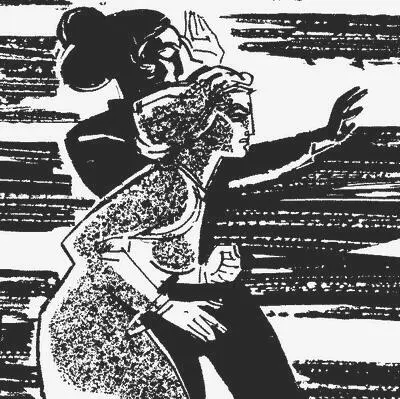Ivan Yefremov - Andromeda (A Space-Age Tale)
Здесь есть возможность читать онлайн «Ivan Yefremov - Andromeda (A Space-Age Tale)» весь текст электронной книги совершенно бесплатно (целиком полную версию без сокращений). В некоторых случаях можно слушать аудио, скачать через торрент в формате fb2 и присутствует краткое содержание. Город: Moscow, Год выпуска: 1959, Издательство: FOREIGN LANGUAGES PUBLISHING HOUSE, Жанр: Фантастика и фэнтези, на английском языке. Описание произведения, (предисловие) а так же отзывы посетителей доступны на портале библиотеки ЛибКат.
- Название:Andromeda (A Space-Age Tale)
- Автор:
- Издательство:FOREIGN LANGUAGES PUBLISHING HOUSE
- Жанр:
- Год:1959
- Город:Moscow
- ISBN:нет данных
- Рейтинг книги:5 / 5. Голосов: 1
-
Избранное:Добавить в избранное
- Отзывы:
-
Ваша оценка:
- 100
- 1
- 2
- 3
- 4
- 5
Andromeda (A Space-Age Tale): краткое содержание, описание и аннотация
Предлагаем к чтению аннотацию, описание, краткое содержание или предисловие (зависит от того, что написал сам автор книги «Andromeda (A Space-Age Tale)»). Если вы не нашли необходимую информацию о книге — напишите в комментариях, мы постараемся отыскать её.
Andromeda (A Space-Age Tale) — читать онлайн бесплатно полную книгу (весь текст) целиком
Ниже представлен текст книги, разбитый по страницам. Система сохранения места последней прочитанной страницы, позволяет с удобством читать онлайн бесплатно книгу «Andromeda (A Space-Age Tale)», без необходимости каждый раз заново искать на чём Вы остановились. Поставьте закладку, и сможете в любой момент перейти на страницу, на которой закончили чтение.
Интервал:
Закладка:
Soon the outer walls of the hull would protect the workers from the effects of a feeling of loneliness in the Cosmos, alone over an abyss that had neither sky nor ground!
Altai sent out a small rescue rocket that shot past the construction job like an arrow. This was a tug going to fetch the automatic rockets carrying only cargo and halting at a given altitude. Just in time! The bundle of rockets, people, machines and building materials, floating in space, was passing over to the night side of the planet. The tug rocket returned pulling behind it three long, gleaming, blue fish-like rockets that weighed a hundred and fifty tons on Earth (without fuel).
The rockets joined their fellows around the assembly platform. In one leap Darr Veter reached the other side of the hull and was soon amongst the technicians supervising the unloading who were gathered in a circle. They were discussing the plan for the night work. Darr Veter consented but insisted that all personal batteries be changed for freshly charged ones with sufficient energy to keep the spacesuits warm for thirty hours and at the same time supply the electric lamps, air filters and radiotelephones.
The whole construction job was plunged in darkness as though it were at the bottom of the sea but the soft zodiacal light from the Sun’s rays dispersed by the gases of the atmospheric zones still lit up the skeleton of the future satellite that was gripped in a frost of 180 degrees C. The superconductivity of the metal now hindered them even more than it did by day. The slightest amount of wear in the insulation of the instruments, batteries or accumulators surrounded the nearby objects with a blue glow from current flowing along their surfaces and which could not be canalised in any given direction.
The profound darkness of outer space came together with increasing cold. The stars burned fiercely like dazzlingly bright blue needles in the sky. The invisible and inaudible flight of the meteoroids was even more awe-inspiring at night. In the currents of the atmosphere over the dark globe down below there were variously coloured clouds of electric glow, spark discharges of tremendous length and sheets of dispersed light thousands of kilometres long. Down below, in the upper layers of the atmosphere there were gales of greater fury than anything known on Earth. Vigorous movements of energy continued in an atmosphere saturated by the radiations of the Sun and the Cosmos and made communication with the planet extremely difficult.
Suddenly something changed in that tiny world lost in the darkness and fearful cold. Darr Veter did not immediately realize that the planetship had switched on its searchlights. The darkness had become even blacker, the burning stars grew dull, leaving the platform and the hull in a sea of bright white light that divided them off from the gloom. A few minutes later Altai reduced the voltage and the light turned yellow and was less intense.
The planetship was economizing current from its accumulators. The squares and ellipses that went to make up the walls of the hull, the latticed trusses that reinforced the structure, the cylinders and pipes of the reservoirs again moved about, finding their places in the skeleton of the satellite as though in daylight.
Darr Veter felt for a cross beam, took hold of the handles of a roller car running on a ropeway, and with one hard push of his feet sailed up to Altai. Right in front of the planetship’s hatch he pressed the brake lever in his hand and halted just in time to prevent his crashing into a closed door.
The air-lock was not kept at normal terrestrial pressure in order not to lose too much air with the coming and going of such a large number of workers. Darr Veter kept on his spacesuit until he was in a second, auxiliary air-lock, where he unscrewed his space helmet and battery.
Flexing a body that was weary of the spacesuit, Darr Veter walked firmly along the deck of the ship, enjoying a return to almost normal gravity. The artificial gravitation of the planetship worked constantly. It was inexpressibly pleasant to feel yourself standing firmly on the ground as a man should stand and not be like a flea floundering in an unsteady, treacherous gulf! Soft light and warm air and a comfortable chair tempted him to stretch out in it and relax without having to think. Darr Veter was experiencing the pleasures of his distant ancestors that had once astonished him in old novels. It was in this way that people entered a warm house, a mud hut or a felt tent after long journeys through cold deserts, wet forests or icy mountains. And now as then a thin wall separated him from a huge, dangerous world, hostile to man, a wall that retained the warmth and light, gave him a chance to rest, gather fresh strength and think over what he was to do next.
Darr Veter did not yield to the temptation of armchair and book. He had to contact Earth — the light burning all night at that height might cause alarm amongst those who were keeping the satellite under observation. It was also necessary to warn Earth that reinforcements would be needed ahead of time.
There was good communication that day and Darr Veter talked with Grom Orme on the TVP and not in coded signals; the TVP was an extremely powerful one, such as was fitted to every spaceship. The old chairman was pleased with the progress made and said he would immediately see about new workers and extra materials.
Darr Veter left the Altai’s control tower and passed through the library that had been re-equipped as a dormitory with two tiers of bunks. Cabins, dining-rooms, the cook’s galley, the side corridors and the forward engine room had all been fitted out with extra bunks. The planet-ship had been converted into a stationary base and was overcrowded. Scarcely able to drag his feet Darr Veter walked down the corridor panelled with plastics warm to the touch, and lazily opened and closed hermetically sealed doors.
He was thinking of astronauts who spent dozens of years inside such a ship without any hope of leaving it before the appointed time, a cruelly long one. He had been living there six months and every day had left the narrow confines to work in the oppressive spaces of interplanetary vacuum. He was already longing for his beautiful Earth with its steppes and seas and the teeming life of the big centres in the inhabited zones. But Erg Noor, Nisa Greet and twenty other people would have to spend ninety-two dependent years or a hundred and forty terrestrial years in a spaceship before it brought them back to their own planet. Not one of them could possibly live so long! Their bodies would be cremated and buried away on the distant planets of the green zirconium star!
Or they would die en route and their bodies enclosed in a funeral rocket would be sent out into the Cosmos just,as the funeral boats of their ancestors swept out to sea carrying dead warriors away with them. But such heroes as those who undertook life-long imprisonment in a spaceship without the hope that they, personally, would return, were unknown in the history of mankind. No, he was wrong, Veda would have rebuked him! How could he have forgotten the nameless fighters for the dignity and freedom of man in distant epochs who undertook even greater risks — horrible tortures and life-long imprisonment in damp dungeons. Yes, these heroes had been stronger and more worthy even than his contemporaries preparing to make their magnificent flight into the Cosmos to explore distant worlds!
And he, Darr Veter, who had never been away from his native planet for any length of time, was a pygmy compared with them and by no means an angel of heaven, as his infinitely dear Veda Kong had called him!
CHAPTER FOURTEEN
THE STEEL DOOR

Интервал:
Закладка:
Похожие книги на «Andromeda (A Space-Age Tale)»
Представляем Вашему вниманию похожие книги на «Andromeda (A Space-Age Tale)» списком для выбора. Мы отобрали схожую по названию и смыслу литературу в надежде предоставить читателям больше вариантов отыскать новые, интересные, ещё непрочитанные произведения.
Обсуждение, отзывы о книге «Andromeda (A Space-Age Tale)» и просто собственные мнения читателей. Оставьте ваши комментарии, напишите, что Вы думаете о произведении, его смысле или главных героях. Укажите что конкретно понравилось, а что нет, и почему Вы так считаете.











